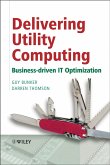Femtocells (eBook, PDF)
Opportunities and Challenges for Business and Technology


Alle Infos zum eBook verschenken

Femtocells (eBook, PDF)
Opportunities and Challenges for Business and Technology
- Format: PDF
- Merkliste
- Auf die Merkliste
- Bewerten Bewerten
- Teilen
- Produkt teilen
- Produkterinnerung
- Produkterinnerung

Hier können Sie sich einloggen

Bitte loggen Sie sich zunächst in Ihr Kundenkonto ein oder registrieren Sie sich bei bücher.de, um das eBook-Abo tolino select nutzen zu können.
Femtocells are low-power wireless access points used in the home and office. They operate in licensed spectrum to connect standard mobile phones (WCDMA, LTE, WiMAX, CDMA and GSM) and other mobile devices to a mobile operator's network via standard broadband internet connections. This technology is of high interest for mobile operators and for millions of users who will benefit from enhanced access to mobile broadband services. Femtocells outlines how wireless access points can be used by mobile operators to provide high-speed wireless access, enhancing coverage and capacity and delivering…mehr
- Geräte: PC
- mit Kopierschutz
- eBook Hilfe
- Größe: 6.35MB
![Cellular Technologies for Emerging Markets (eBook, PDF) Cellular Technologies for Emerging Markets (eBook, PDF)]() Ajay R. MishraCellular Technologies for Emerging Markets (eBook, PDF)91,99 €
Ajay R. MishraCellular Technologies for Emerging Markets (eBook, PDF)91,99 €![Trust, Complexity and Control (eBook, PDF) Trust, Complexity and Control (eBook, PDF)]() Piotr CoftaTrust, Complexity and Control (eBook, PDF)98,99 €
Piotr CoftaTrust, Complexity and Control (eBook, PDF)98,99 €![Delivering Utility Computing (eBook, PDF) Delivering Utility Computing (eBook, PDF)]() Guy BunkerDelivering Utility Computing (eBook, PDF)98,99 €
Guy BunkerDelivering Utility Computing (eBook, PDF)98,99 €![Short Message Service (SMS) (eBook, PDF) Short Message Service (SMS) (eBook, PDF)]() Short Message Service (SMS) (eBook, PDF)52,99 €
Short Message Service (SMS) (eBook, PDF)52,99 €![Green Communications (eBook, PDF) Green Communications (eBook, PDF)]() Green Communications (eBook, PDF)88,99 €
Green Communications (eBook, PDF)88,99 €![Connected Services (eBook, PDF) Connected Services (eBook, PDF)]() Paul GoldingConnected Services (eBook, PDF)68,99 €
Paul GoldingConnected Services (eBook, PDF)68,99 €![Femtocells (eBook, PDF) Femtocells (eBook, PDF)]() Jie ZhangFemtocells (eBook, PDF)88,99 €
Jie ZhangFemtocells (eBook, PDF)88,99 €-
-
-
Dieser Download kann aus rechtlichen Gründen nur mit Rechnungsadresse in A, B, BG, CY, CZ, D, DK, EW, E, FIN, F, GR, HR, H, IRL, I, LT, L, LR, M, NL, PL, P, R, S, SLO, SK ausgeliefert werden.
- Produktdetails
- Verlag: Wiley
- Seitenzahl: 252
- Erscheinungstermin: 18. Mai 2009
- Englisch
- ISBN-13: 9780470748206
- Artikelnr.: 37299047
- Verlag: Wiley
- Seitenzahl: 252
- Erscheinungstermin: 18. Mai 2009
- Englisch
- ISBN-13: 9780470748206
- Artikelnr.: 37299047
- Herstellerkennzeichnung Die Herstellerinformationen sind derzeit nicht verfügbar.
Foreword xix
Preface xxi
Acknowledgements xxiii
Abbreviations xxv
List of Figures xxxv
List of Tables xxxix
1 Introduction to Femtocells 1
Simon Saunders
1.1 Introduction 1
1.2 Why Femtocells? The Market Context 1
1.3 The Nature of Mobile Broadband Demand 2
1.4 What is a Femtocell? 4
1.4.1 Femtocell Attributes 6
1.4.2 Femtocell Standards 7
1.4.3 Types of Femtocell 7
1.5 Applications for Femtocells 7
1.6 What a Femtocell is not 8
1.7 The Importance of 'Zero-Touch' 10
1.8 User Benefits 11
1.9 Operator Motivations and Economic Impact 13
1.10 Operator Responses 14
1.11 Challenges 15
1.12 Chapter Overview 15
2 Small Cell Background and Success Factors 17
Simon Saunders
2.1 Introduction 17
2.2 Small Cell Motivations 17
2.2.1 Cellular Principles 17
2.2.2 Conventional Cell Types: Why 'Femtocells'? 18
2.2.3 Challenges of Achieving Indoor Coverage from Outdoor Macrocells 20
2.2.4 Spectrum Efficiency 21
2.2.5 Geometry Factors 23
2.2.6 The Backhaul Challenge 24
2.3 Other Small-Cell Systems 24
2.3.1 Overview 24
2.3.2 Picocells 24
2.3.3 Distributed Antenna Systems 25
2.3.4 Wireless Local Area Networks 27
2.4 The Small-Cell Landscape 28
2.5 Emergence of the Femtocell - Critical Success Factors 29
2.5.1 Mobile Data Adoption and Revenue Growth 30
2.5.2 Broadband Adoption 30
2.5.3 Connecting Four Billion Users - And Counting 31
2.5.4 Internet Applications 33
2.5.5 Fixed-Mobile Substitution 33
2.5.6 User Device Availability 36
2.5.7 Processing Power and Cost 36
2.6 Conclusions 37
3 Market Issues for Femtocells 39
Stuart Carlaw
3.1 Key Benefits of a Femtocell from Market Perspective 39
3.1.1 In-Home Coverage 39
3.1.2 Macro Network Capacity Gain 40
3.1.3 Termination Fees 40
3.1.4 Simplistic Handset Approach 41
3.1.5 Home Footprint and the Quadruple Play 41
3.1.6 Maximising Returns on Spectrum Investment 42
3.1.7 Churn Reduction - The Sticky Bundle 42
3.1.8 Positive Impact on Subsidisation Trends 43
3.1.9 Value-Added Services 43
3.1.10 Changing User Behaviour 43
3.1.11 Reducing Energy Consumption 44
3.2 Key Primers 44
3.2.1 Broadband Penetration 44
3.2.2 Saturation 45
3.2.3 Evolution in Carrier Business Model 46
3.2.4 Competition 47
3.2.5 Technical Feasibility 48
3.2.6 Economics 48
3.2.7 Limitations in Other Services 49
3.2.8 Carrier and Manufacturer Support 49
3.2.9 Consumer Demand 50
3.2.10 Supporting the Data Boom 50
3.2.11 Growing Standardisation 50
3.2.12 Air Interface Technology Evolution 52
3.3 Key Market Challenges 52
3.3.1 Cost Pressure 52
3.3.2 Intellectual Property Rights 53
3.3.3 Technology Issues 53
3.3.4 Establishing a 'Sellable' Proposition 54
3.3.5 Disconnect Between OEMs and Carriers 54
3.3.6 Too Much Reliance on Standards 54
3.3.7 Window of Opportunity 55
3.3.8 Developing the Ecosystem 55
3.4 Business Cases for Femtocells 55
3.4.1 Business Case Foundations 55
3.4.2 Exploring the Economics 57
3.5 Air Interface Choices 60
3.5.1 GSM Advantages 60
3.5.2 GSM Disadvantages 61
3.5.3 WCDMA Advantages 61
3.5.4 WCDMA Disadvantages 61
3.5.5 Conclusions 61
3.5.6 HSDPA, HSUPA and HSPA+ 62
3.6 Product Feature Sets 62
3.6.1 Stand-Alone 62
3.6.2 Broadband Gateway 63
3.6.3 Wi-Fi Access Point 63
3.6.4 TV Set-Top Box 63
3.6.5 Video Distribution Mechanisms 64
3.6.6 Segmentation 64
3.7 Additional Considerations 64
3.7.1 Enterprise Femtocells 64
3.7.2 Super-Femtocells and Outdoor Femtocells 65
3.8 Adoption Forecasts and Volumes 65
3.8.1 Methodology 65
3.8.2 Forecasts 68
3.9 Conclusions 70
4 Radio Issues for Femtocells 71
Simon Saunders
4.1 Introduction 71
4.2 Spectrum Scenarios 71
4.3 Propagation in Femtocell Environments 73
4.4 Coverage 74
4.5 Downlink Interference 75
4.6 Interference Challenges and Mitigations 79
4.7 Femtocell-to-Femtocell Interference 80
4.8 System-Level Performance 81
4.9 RF Specifications in WCDMA 84
4.10 Health and Safety Concerns 86
4.11 Conclusions 89
5 Femtocell Networks and Architectures 91
Andrea Giustina
5.1 Introduction 91
5.2 Challenges 92
5.3 Requirements 93
5.4 Femto Architectures and Interfaces 94
5.5 Key Architectural Choices 96
5.5.1 Connecting Remote Femtocells 96
5.5.2 Integrating the Femto Network with the Macro Network 98
5.5.3 Functional Split between the FAP and the FGW 100
5.6 Other Important Femto Solution Aspects 101
5.6.1 End-to-End Quality of Service 102
5.6.2 Local Access (Data and Voice) 103
5.6.3 Femtozone Services 105
5.6.4 Mobility 106
5.6.5 Femtocell Location 108
5.6.6 Enterprise and Open Spaces 109
5.7 UMTS Femtos 110
5.7.1 Iuh Protocol Stacks 110
5.8 CDMA 112
5.9 WiMAX 113
5.10 GSM 114
5.11 LTE 115
5.12 Conclusions 116
6 Femtocell Management 117
Ravi Raj Bhat and V. Srinivasa Rao
6.1 Introduction 117
6.2 Femtocell FCAPS Requirements 118
6.2.1 Fault and Event Management 119
6.2.2 Configuration Management 119
6.2.3 Accounting and Administration Management 119
6.2.4 Performance Management 120
6.2.5 Security Management 120
6.3 Broadband Forum Auto-Configuration Architecture and Framework 120
6.4 Auto-Configuration Data Organisation 121
6.4.1 Data Hierarchy 121
6.4.2 Profiles 123
6.5 CPE WAN Management Protocol Overview 123
6.5.1 Protocol Stack and Operation 124
6.6 FAP Service Data Model 126
6.6.1 Control Object Group 126
6.6.2 Configuration Object Group 126
6.6.3 Monitoring Object Group 128
6.6.4 Management Object Group 129
6.7 DOCSIS OSS Architecture and Framework 129
6.8 Conclusions 132
7 Femtocell Security 133
Rasa Siegberg
7.1 Why is Security Important? 133
7.1.1 Viewpoint: Continuity 133
7.1.2 Viewpoint: (Contained) Change 134
7.2 The Threat Model 134
7.2.1 Threats from 'Outsiders' - Third Parties 135
7.2.2 Threats from 'Insiders' - Device Owners 135
7.3 Countering the Threats 136
7.3.1 Radio Link Protection 136
7.3.2 Protecting the (IP) Backhaul 138
7.3.3 Device Integrity - Tamper Resistance 143
7.4 Conclusions 145
8 Femtocell Standards and Industry Groups 147
Simon Saunders
8.1 The Importance of Standards 147
8.2 GSM 148
8.3 WCDMA 148
8.3.1 TSG RAN WG2 - Radio Layer 2 and Radio Layer 3 RR 149
8.3.2 TSG RAN WG3 Architecture 149
8.3.3 TSG RAN WG4 Radio Performance and Protocol Aspects RF Parameters and
BS Conformance 150
8.3.4 TSG SA WG1 - Services 150
8.3.5 TSG SA WG3 - Security 150
8.3.6 TSG SA WG5 Telecom Management 151
8.3.7 Summary of WCDMA Standards 151
8.4 TD-SCDMA 151
8.5 LTE 151
8.6 CDMA 153
8.7 Mobile WiMAX 155
8.8 The Femto Forum 156
8.9 The Broadband Forum 157
8.10 GSMA 157
8.11 Conclusions 157
9 Femtocell Regulation 159
Simon Saunders
9.1 Introduction 159
9.2 Regulatory Benefits of Femtocells 159
9.3 Spectrum Efficiency 160
9.4 Economic Efficiency 160
9.5 Enabling Competition 160
9.6 Broadening Access to Services 161
9.7 Enabling Innovation 161
9.8 Environmental Goals 161
9.9 Spectrum Licensing Issues 162
9.10 Location 163
9.11 Authentication 163
9.12 Emergency Calls 163
9.13 Lawful Interception and Local IP Access 164
9.14 Backhaul Challenges 165
9.15 Mobile Termination Rates 165
9.16 Competition Concerns 166
9.17 Equipment Approvals 166
9.18 Examples of Femtocell Regulations 166
9.19 Conclusions 168
10 Femtocell Implementation Considerations 169
Simon Saunders
10.1 Introduction 169
10.2 Signal Processing 170
10.3 Location 170
10.4 Frequency and Timing Control 171
10.5 Protocol Implementation 172
10.6 RF Implementation 172
10.7 System Design and Cost 173
10.8 Mobile Device Challenges and Opportunities 175
10.9 Conclusions 176
11 Business and Service Options for Femtocells 177
Simon Saunders and Stuart Carlaw
11.1 Introduction 177
11.2 Ways of being a Femtocell Operator 177
11.3 Femtocells for Fixed-Line Operators 180
11.4 Types of Femtocell Service 181
11.5 Service Examples 182
11.5.1 Femtozone Services 182
11.5.2 Connected Home Services 184
11.6 Service Enablers 185
11.6.1 Service Implementation 186
11.7 Stages of Femtocell Service Introduction 186
11.7.1 Stage 1 - Supporting Fixed Mobile Substitution 187
11.7.2 Stage 2 - Prompting Mobile Data Uptake 187
11.7.3 Stage 3 - Bringing the Mobile Phone into the Connected Home Concept
187
11.7.4 Stage 4 - Taking the Connected Home into the Wider World 187
11.8 Conclusions 188
12 Summary: The Status and Future of Femtocells 189
Simon Saunders
12.1 Summary 189
12.2 Potential Future Femtocell Landscape 191
12.2.1 Growth of Femtocell Adoption 191
12.2.2 Femtocells in Homes and Offices 192
12.2.3 Femtocells in Developing and Rural Markets 192
12.2.4 Femtocells Outdoors 192
12.2.5 Femtocell-Only Operators 193
12.2.6 Femtos Enabling Next-Generation Mobile Networks 193
12.2.7 When is a Femtocell not a Femtocell? 195
12.3 Concluding Remarks 195
References 197
Further Reading 203
Appendix: A Brief Guide to Units and Spectrum 205
Index 207
Foreword xix
Preface xxi
Acknowledgements xxiii
Abbreviations xxv
List of Figures xxxv
List of Tables xxxix
1 Introduction to Femtocells 1
Simon Saunders
1.1 Introduction 1
1.2 Why Femtocells? The Market Context 1
1.3 The Nature of Mobile Broadband Demand 2
1.4 What is a Femtocell? 4
1.4.1 Femtocell Attributes 6
1.4.2 Femtocell Standards 7
1.4.3 Types of Femtocell 7
1.5 Applications for Femtocells 7
1.6 What a Femtocell is not 8
1.7 The Importance of 'Zero-Touch' 10
1.8 User Benefits 11
1.9 Operator Motivations and Economic Impact 13
1.10 Operator Responses 14
1.11 Challenges 15
1.12 Chapter Overview 15
2 Small Cell Background and Success Factors 17
Simon Saunders
2.1 Introduction 17
2.2 Small Cell Motivations 17
2.2.1 Cellular Principles 17
2.2.2 Conventional Cell Types: Why 'Femtocells'? 18
2.2.3 Challenges of Achieving Indoor Coverage from Outdoor Macrocells 20
2.2.4 Spectrum Efficiency 21
2.2.5 Geometry Factors 23
2.2.6 The Backhaul Challenge 24
2.3 Other Small-Cell Systems 24
2.3.1 Overview 24
2.3.2 Picocells 24
2.3.3 Distributed Antenna Systems 25
2.3.4 Wireless Local Area Networks 27
2.4 The Small-Cell Landscape 28
2.5 Emergence of the Femtocell - Critical Success Factors 29
2.5.1 Mobile Data Adoption and Revenue Growth 30
2.5.2 Broadband Adoption 30
2.5.3 Connecting Four Billion Users - And Counting 31
2.5.4 Internet Applications 33
2.5.5 Fixed-Mobile Substitution 33
2.5.6 User Device Availability 36
2.5.7 Processing Power and Cost 36
2.6 Conclusions 37
3 Market Issues for Femtocells 39
Stuart Carlaw
3.1 Key Benefits of a Femtocell from Market Perspective 39
3.1.1 In-Home Coverage 39
3.1.2 Macro Network Capacity Gain 40
3.1.3 Termination Fees 40
3.1.4 Simplistic Handset Approach 41
3.1.5 Home Footprint and the Quadruple Play 41
3.1.6 Maximising Returns on Spectrum Investment 42
3.1.7 Churn Reduction - The Sticky Bundle 42
3.1.8 Positive Impact on Subsidisation Trends 43
3.1.9 Value-Added Services 43
3.1.10 Changing User Behaviour 43
3.1.11 Reducing Energy Consumption 44
3.2 Key Primers 44
3.2.1 Broadband Penetration 44
3.2.2 Saturation 45
3.2.3 Evolution in Carrier Business Model 46
3.2.4 Competition 47
3.2.5 Technical Feasibility 48
3.2.6 Economics 48
3.2.7 Limitations in Other Services 49
3.2.8 Carrier and Manufacturer Support 49
3.2.9 Consumer Demand 50
3.2.10 Supporting the Data Boom 50
3.2.11 Growing Standardisation 50
3.2.12 Air Interface Technology Evolution 52
3.3 Key Market Challenges 52
3.3.1 Cost Pressure 52
3.3.2 Intellectual Property Rights 53
3.3.3 Technology Issues 53
3.3.4 Establishing a 'Sellable' Proposition 54
3.3.5 Disconnect Between OEMs and Carriers 54
3.3.6 Too Much Reliance on Standards 54
3.3.7 Window of Opportunity 55
3.3.8 Developing the Ecosystem 55
3.4 Business Cases for Femtocells 55
3.4.1 Business Case Foundations 55
3.4.2 Exploring the Economics 57
3.5 Air Interface Choices 60
3.5.1 GSM Advantages 60
3.5.2 GSM Disadvantages 61
3.5.3 WCDMA Advantages 61
3.5.4 WCDMA Disadvantages 61
3.5.5 Conclusions 61
3.5.6 HSDPA, HSUPA and HSPA+ 62
3.6 Product Feature Sets 62
3.6.1 Stand-Alone 62
3.6.2 Broadband Gateway 63
3.6.3 Wi-Fi Access Point 63
3.6.4 TV Set-Top Box 63
3.6.5 Video Distribution Mechanisms 64
3.6.6 Segmentation 64
3.7 Additional Considerations 64
3.7.1 Enterprise Femtocells 64
3.7.2 Super-Femtocells and Outdoor Femtocells 65
3.8 Adoption Forecasts and Volumes 65
3.8.1 Methodology 65
3.8.2 Forecasts 68
3.9 Conclusions 70
4 Radio Issues for Femtocells 71
Simon Saunders
4.1 Introduction 71
4.2 Spectrum Scenarios 71
4.3 Propagation in Femtocell Environments 73
4.4 Coverage 74
4.5 Downlink Interference 75
4.6 Interference Challenges and Mitigations 79
4.7 Femtocell-to-Femtocell Interference 80
4.8 System-Level Performance 81
4.9 RF Specifications in WCDMA 84
4.10 Health and Safety Concerns 86
4.11 Conclusions 89
5 Femtocell Networks and Architectures 91
Andrea Giustina
5.1 Introduction 91
5.2 Challenges 92
5.3 Requirements 93
5.4 Femto Architectures and Interfaces 94
5.5 Key Architectural Choices 96
5.5.1 Connecting Remote Femtocells 96
5.5.2 Integrating the Femto Network with the Macro Network 98
5.5.3 Functional Split between the FAP and the FGW 100
5.6 Other Important Femto Solution Aspects 101
5.6.1 End-to-End Quality of Service 102
5.6.2 Local Access (Data and Voice) 103
5.6.3 Femtozone Services 105
5.6.4 Mobility 106
5.6.5 Femtocell Location 108
5.6.6 Enterprise and Open Spaces 109
5.7 UMTS Femtos 110
5.7.1 Iuh Protocol Stacks 110
5.8 CDMA 112
5.9 WiMAX 113
5.10 GSM 114
5.11 LTE 115
5.12 Conclusions 116
6 Femtocell Management 117
Ravi Raj Bhat and V. Srinivasa Rao
6.1 Introduction 117
6.2 Femtocell FCAPS Requirements 118
6.2.1 Fault and Event Management 119
6.2.2 Configuration Management 119
6.2.3 Accounting and Administration Management 119
6.2.4 Performance Management 120
6.2.5 Security Management 120
6.3 Broadband Forum Auto-Configuration Architecture and Framework 120
6.4 Auto-Configuration Data Organisation 121
6.4.1 Data Hierarchy 121
6.4.2 Profiles 123
6.5 CPE WAN Management Protocol Overview 123
6.5.1 Protocol Stack and Operation 124
6.6 FAP Service Data Model 126
6.6.1 Control Object Group 126
6.6.2 Configuration Object Group 126
6.6.3 Monitoring Object Group 128
6.6.4 Management Object Group 129
6.7 DOCSIS OSS Architecture and Framework 129
6.8 Conclusions 132
7 Femtocell Security 133
Rasa Siegberg
7.1 Why is Security Important? 133
7.1.1 Viewpoint: Continuity 133
7.1.2 Viewpoint: (Contained) Change 134
7.2 The Threat Model 134
7.2.1 Threats from 'Outsiders' - Third Parties 135
7.2.2 Threats from 'Insiders' - Device Owners 135
7.3 Countering the Threats 136
7.3.1 Radio Link Protection 136
7.3.2 Protecting the (IP) Backhaul 138
7.3.3 Device Integrity - Tamper Resistance 143
7.4 Conclusions 145
8 Femtocell Standards and Industry Groups 147
Simon Saunders
8.1 The Importance of Standards 147
8.2 GSM 148
8.3 WCDMA 148
8.3.1 TSG RAN WG2 - Radio Layer 2 and Radio Layer 3 RR 149
8.3.2 TSG RAN WG3 Architecture 149
8.3.3 TSG RAN WG4 Radio Performance and Protocol Aspects RF Parameters and
BS Conformance 150
8.3.4 TSG SA WG1 - Services 150
8.3.5 TSG SA WG3 - Security 150
8.3.6 TSG SA WG5 Telecom Management 151
8.3.7 Summary of WCDMA Standards 151
8.4 TD-SCDMA 151
8.5 LTE 151
8.6 CDMA 153
8.7 Mobile WiMAX 155
8.8 The Femto Forum 156
8.9 The Broadband Forum 157
8.10 GSMA 157
8.11 Conclusions 157
9 Femtocell Regulation 159
Simon Saunders
9.1 Introduction 159
9.2 Regulatory Benefits of Femtocells 159
9.3 Spectrum Efficiency 160
9.4 Economic Efficiency 160
9.5 Enabling Competition 160
9.6 Broadening Access to Services 161
9.7 Enabling Innovation 161
9.8 Environmental Goals 161
9.9 Spectrum Licensing Issues 162
9.10 Location 163
9.11 Authentication 163
9.12 Emergency Calls 163
9.13 Lawful Interception and Local IP Access 164
9.14 Backhaul Challenges 165
9.15 Mobile Termination Rates 165
9.16 Competition Concerns 166
9.17 Equipment Approvals 166
9.18 Examples of Femtocell Regulations 166
9.19 Conclusions 168
10 Femtocell Implementation Considerations 169
Simon Saunders
10.1 Introduction 169
10.2 Signal Processing 170
10.3 Location 170
10.4 Frequency and Timing Control 171
10.5 Protocol Implementation 172
10.6 RF Implementation 172
10.7 System Design and Cost 173
10.8 Mobile Device Challenges and Opportunities 175
10.9 Conclusions 176
11 Business and Service Options for Femtocells 177
Simon Saunders and Stuart Carlaw
11.1 Introduction 177
11.2 Ways of being a Femtocell Operator 177
11.3 Femtocells for Fixed-Line Operators 180
11.4 Types of Femtocell Service 181
11.5 Service Examples 182
11.5.1 Femtozone Services 182
11.5.2 Connected Home Services 184
11.6 Service Enablers 185
11.6.1 Service Implementation 186
11.7 Stages of Femtocell Service Introduction 186
11.7.1 Stage 1 - Supporting Fixed Mobile Substitution 187
11.7.2 Stage 2 - Prompting Mobile Data Uptake 187
11.7.3 Stage 3 - Bringing the Mobile Phone into the Connected Home Concept
187
11.7.4 Stage 4 - Taking the Connected Home into the Wider World 187
11.8 Conclusions 188
12 Summary: The Status and Future of Femtocells 189
Simon Saunders
12.1 Summary 189
12.2 Potential Future Femtocell Landscape 191
12.2.1 Growth of Femtocell Adoption 191
12.2.2 Femtocells in Homes and Offices 192
12.2.3 Femtocells in Developing and Rural Markets 192
12.2.4 Femtocells Outdoors 192
12.2.5 Femtocell-Only Operators 193
12.2.6 Femtos Enabling Next-Generation Mobile Networks 193
12.2.7 When is a Femtocell not a Femtocell? 195
12.3 Concluding Remarks 195
References 197
Further Reading 203
Appendix: A Brief Guide to Units and Spectrum 205
Index 207







